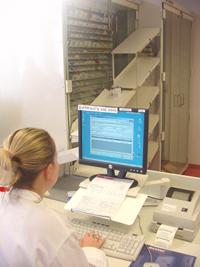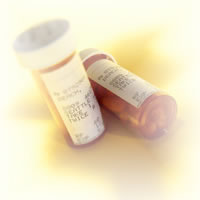
The Internet has changed the way we live, work and shop. The growth of the Internet has made it possible to compare prices and buy products without ever leaving home. But when it comes to buying medicine online, it is important to be very careful. Some websites sell medicine that may not be safe to use and could put your health at risk. The medicines that sold online can be fake (counterfeit or 'copycat' medicines); can be too strong or too weak, or have dangerous ingredients, or have expired (are out-of-date), or haven't been approved or checked for safety and effectiveness, can be made using non-safe standards, or not safe to use with other medicine or products you use. You have to talk with your doctor and have a physical exam before you get any new medicine for the first time. Use only medicine that has been prescribed by your doctor or another trusted professional. Buying your medicine online can be easy. Just make sure you do it safely.
Drug interactions may make your drug less effective, cause unexpected side effects, or increase the action of a particular drug. Some drug interactions can even be harmful to you. A drug may affect these enzymes by inhibiting them, which causes reduced activity of the enzyme and a buildup of the drug in the body. Or drugs may "induce" the enzymes, which causes increased activity of the enzyme and a reduction of the drug in the body. This phase of research in test tubes, known as in vitro studies, allows researchers to perform drug-interaction studies in labs by testing a drug with other drugs that have the same route. This has made the research faster and more accurate. If two drugs go through the same enzyme, the presence of one drug can prevent the metabolism of the other. So this allows you to look at the worst-case scenarios and ask: 'What if we put this drug with that one, knowing that they have the same route?'" Not everything that happens in a test tube will become meaningful in humans, though. Results from these test-tube studies can tell us whether need to do further testing in people to find out if an interaction is clinically significant. Three phases of clinical trials in humans must happen before a drug can be marketed. Phase 1 studies focus on a drug's side effects and how the drug is metabolized and eliminated from the body. Phase 2 studies focus on a drug's effectiveness. And Phase 3 studies gather more information on safety and effectiveness, which includes using the drug in combination with other drugs. Researchers say there are several important variables that affect individual differences in how drugs are metabolized, including race, gender, age, and health conditions. For example, people with kidney or liver disease don't eliminate drugs from their system as well as people who are healthy. Very young children and older people have slower drug metabolism than others, and women may metabolize drugs differently than men in some cases. Over the last several years, there has been a substantial increase in the number of drug-interaction studies the FDA sees in new drug applications. If drug interactions are significant enough, they can prevent a drug from being approved by the FDA. If the agency determines that known drug interactions can be managed and that a drug's benefits outweigh the risks for the intended population, a drug will be approved. Drug-interaction information then goes into the drug's labeling in the sections on "clinical pharmacology," "precautions," "warnings," "contraindications," and "dosage and administration." In addition to having a good grasp of drugs and their effects, doctors take medication histories, and they consult with other members of their team to guide them in making decisions about drug interactions. They also use concise drug summaries and resources on pharmacological principles. The large number of drugs on the market, combined with the common use of multiple medications, makes the risk for drug interactions significant. Consumers need to tell doctors what they're taking and ask questions, and health professionals could do a better job at trying to get the information they want. But it is good way -- consumers remind doctors of everything they take when they are prescribed a new medication. So a patient might say: "Now remember, I'm also taking birth control pills. Is there a risk of interaction with this new medicine?" Drug interactions with other drugs includes both prescription and over-the-counter medicines. Tricyclic antidepressants such as Elavil (amitriptyline) and Pamelor (nortriptyline) can interfere with blood pressure-lowering Catapres (clonidine). Taking the antibiotic Cipro (ciprofloxacin) with antacids lowers Cipro's effectiveness. Some antibiotics, such as rifampin, can lower the effectiveness of birth control pills. Sildenafil, the active ingredient in the erectile dysfunction drug Viagra, should not be taken with nitrates for heart treatment because of the potential for dangerously low blood pressure. Drug interactions with food and beverages, for example, taking quinolone antibiotics such as ciprofloxacin with food and drinks such as colas, coffee, and chocolate that contain caffeine may cause excitability and nervousness. There can be a potentially fatal increase in blood pressure if food containing tyramine is eaten when taking monoamine oxidase inhibitors, drugs that treat mood disorders.
Although medicines can make you feel better and help you get well, it's important to know that all medicines, both prescription and over-the-counter, have risks as well as benefits. The same is true before using any medicine. Every choice to take a medicine involves thinking through the helpful effects as well as the possible unwanted effects. The benefit and risk decision is sometimes difficult to make. The best choice depends on your particular situation. You must decide what risks you can and will accept in order to get the benefits you want. For example, if facing a life-threatening illness, you might choose to accept more risk in the hope of getting the benefits of a cure or living a longer life. On the other hand, if you are facing a minor illness, you might decide that you want to take very little risk. Important things is tell to your doctor about any allergies or sensitivities that you may have. Tell about anything that could affect your ability to take medicines, such as difficulty swallowing or remembering to take them. Before use a medicine make sure you understand the directions; ask your doctor if you have questions or concerns. Always double check that you have the right medicine. Read and follow the directions on the label and the directions from your doctor, pharmacist, or other health care professional. If you stop the medicine or want to use the medicine differently than directed, consult with your health care professional. Ask your doctor if there is anything you can do to minimize side effects, such as eating before you take a medicine to reduce stomach upset.

|